On International Women’s Day meet five women who are blazing their own entrepreneurial paths
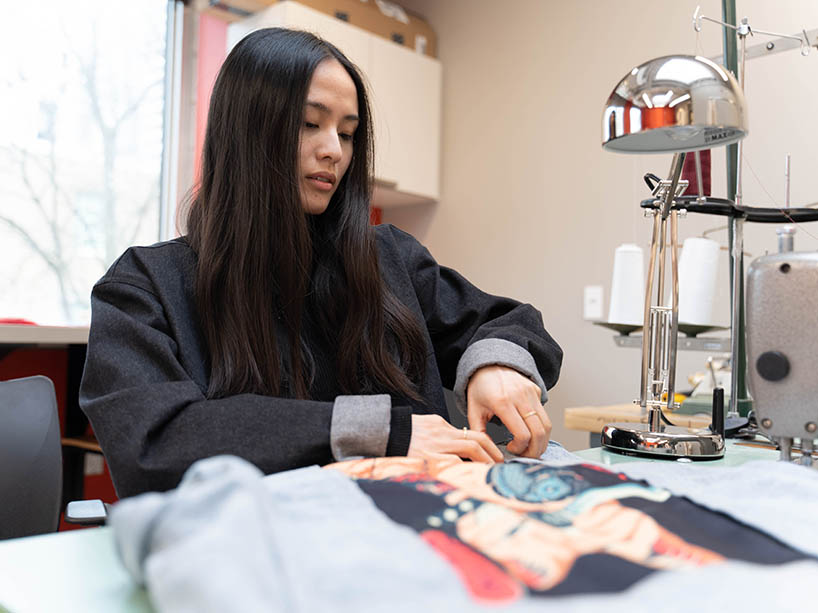
Jane Souralaysack and her co-founder TMU grad Lake Siva invented the world’s first jacket with swappable art. Photo credit: Jaye Huynh.
International Women’s Day is an opportunity to celebrate women and bring attention to issues such as gender equality, reproductive rights and violence and abuse against women. People around the world take the day to celebrate incredible women who are tackling complex political, social and economic issues.
The Zone Learning network at TMU helps empower women-identifying founders to reach their entrepreneurial goals and pursue their passions through incubation in one of 10 TMU Zones. TorontoMet Today caught up with five women-identifying entrepreneurs about their journeys and how the Zone Learning network is helping them create successful businesses.

Ria Arora is hoping to change the way second-generation South Asian Canadians explore their Brown problems. Photo credit: Jaye Huynh.
Name: Ria Arora
Program: Graduate student in the master’s of social work program at the Faculty of Community Services
Company: South Asian Yard (external link)
Tell me about your company and what inspired the idea?
I founded SAY when I was 21 while completing my undergraduate degree in social work at Toronto Metropolitan University. I came up with the idea in response to my experiences as a queer daughter of immigrant parents without having a space or community to lean on. Three months after incorporation, Mahira Khan joined me as our creative partner, breaking the five year gap since working together on a similar initiative in high school.
What are some of the challenges you have faced being a woman in entrepreneurship?
I struggled with being a student while representing SAY as an institution. I felt as though my membership as a student and a young adult was somewhat revoked because of the new accountability and expectations that I’m now being held too. I’m grateful and privileged for the new opportunities coming my way, but I’ve also had to learn to integrate into this new positionality that I wasn’t prepared to welcome so early in my life. However, my mentor JP Silva, education experience navigator and instructor, has been playing a helping hand in supporting me in this new transition.
How has Zone Learning helped you in your journey?
I was introduced to Zone Learning through the ZON100 course that I took as an elective in my master’s program. This is where I met JP, who supported me and understood my struggles with my South Asian identity. At the end of the course I asked him to be my mentor and he is helping me navigate issues on my entrepreneurial journey.
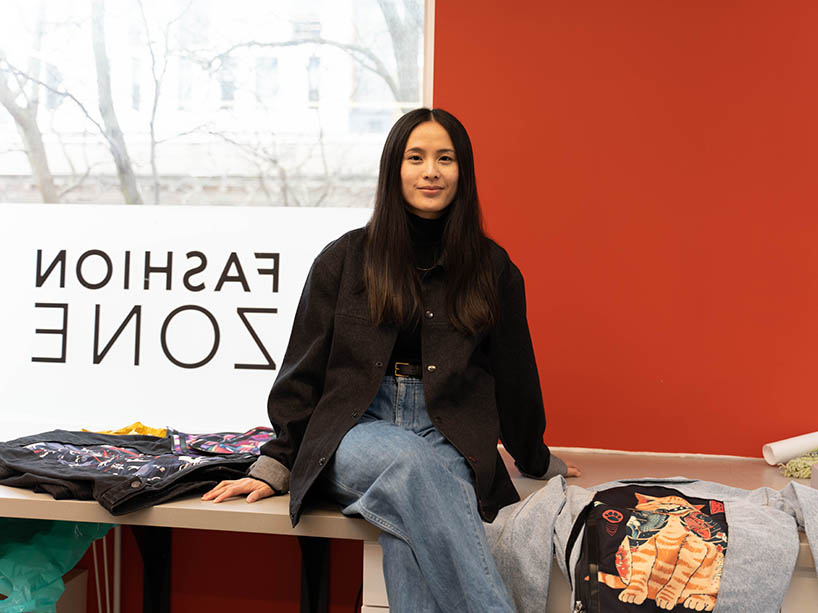
Jane Souralaysack says the Fashion Zone helped her improve her business in more ways than one. Photo credit: Jaye Huynh.
Name: Jane Souralaysack
Company: SwapWear (formerly Creator Jacket) (external link)
Tell me about your company and what inspired the idea?
My co-founder Lake Siva, a TMU grad in graphic communications management, is a breakdancer and I’m a beatboxer – we met performing at a gig. For both of us, art on the back of jackets was something we had always wanted, but it was difficult to find, expensive when you did, and hard to commit to. That’s why we invented the world’s first jacket with swappable art.
What are some of the challenges you have faced being a woman in entrepreneurship?
Coming from my art form in the urban arts background, I’m used to being one of very few women in a very male dominated space. One of the biggest challenges I’ve faced is being able to find other women-identifying entrepreneurs to connect with. I have also faced moments where I was treated differently because I am a woman and I’ve learned to stand my ground, diffuse these types of situations and move on so I can focus on my business.
How has Zone Learning helped you in your journey?
Ever since we joined the Fashion Zone, we’ve gone out of our comfort zones and learned so much. We were able to connect with industry experts in the fashion space and make huge improvements to our newest jacket design.
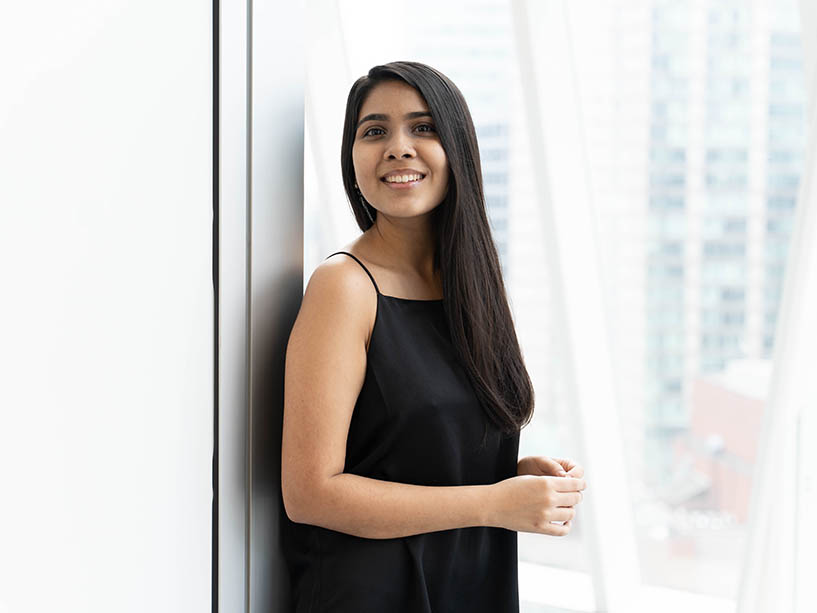
Suha Lalani is changing the way sex education is perceived in rural Pakistan. Photo credit: Jaye Huynh.
Name: Suha Lalani
Program: Fourth year student in the biomedical sciences program at the Faculty of Science
Company: Aurat Raaj (external link)
Tell me about your company and what inspired the idea?
Growing up in Pakistan, I couldn't help but notice the hush-hush attitude towards sex education. When a lot of my friends had their periods for the first time, they did not know what was happening to them or their bodies. I also vividly remember my Biology teacher skipping over the reproduction chapter altogether as if it never existed.
In 2018 I got involved with Aurat Raaj because I really wanted to promote reproductive health education and menstrual health management in low income settlements of Pakistan using technology. Last year, I helped launch Raaji reusable pads, an affordable, accessible and inclusive menstrual product made for and by indigenous Pakistani women.
What are some of the challenges you have faced being a woman in entrepreneurship?
Sex education is a huge stigma and it’s very hard to talk about. When we were doing pitch competitions in Pakistan, the entire panel of venture capitalist judges were male and it was hard for them to relate to the topic because it wasn’t a process they went through every month. As we continue breaking barriers, securing funding is still very hard and something we are navigating.
How has Zone Learning helped you in your journey?
We incubated in the Social Venture Zone in 2020, which has been hugely helpful as I developed my entrepreneurial skills. The Zone also helped us secure $20,000 funding for Raaji Pads through the Social Venture Prize, Gordon & Helen Love Family Entrepreneurial Award and Penny Appeal social accelerator fund.
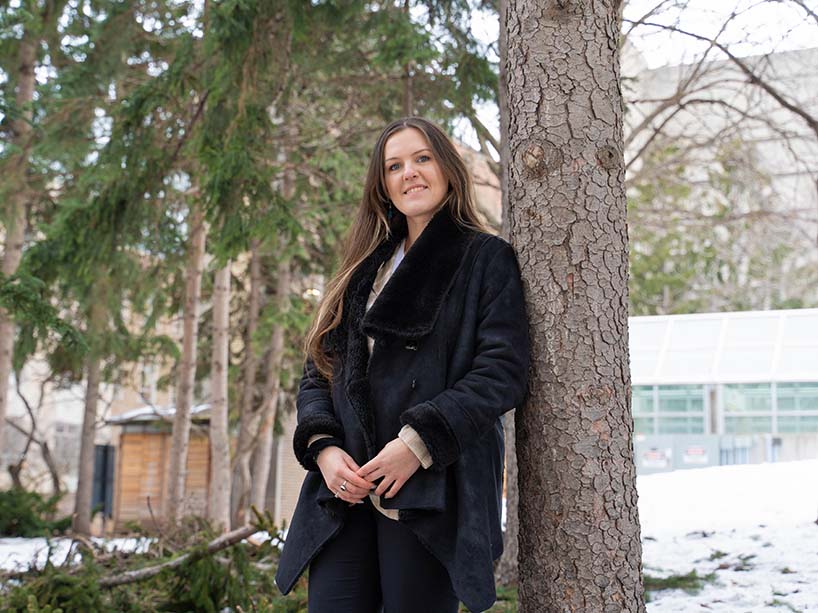
Polina Amaya started a mushroom supply and farm company with her husband to allow people to grow mushrooms at home. Photo credit: Jaye Huynh.
Name: Polina Amaya
Program: Fourth year student in the professional communications program at The Creative School
Company: Fungi For You (external link)
Tell me about your company and what inspired the idea?
I started the company with my husband, who used to work in the restaurant industry. He noticed that there was a need for fresh mushrooms in kitchens across the city, so he decided to start making them from scratch.
When we realized we could do it ourselves, we decided to start a company that would allow people to grow their own mushrooms at home. We provide bulk mushroom growing materials such as substrate, grain bags and spawn and offer training for those wanting to start their own mushroom farm.
What are some of the challenges you have faced being a woman in entrepreneurship?
One of the challenges I have faced is men tending to see the work that I do in a supporting role – as an assistant or organizer – even though I am bringing more to the business. I am continuing to fight for more recognition as a woman-identifying entrepreneur.
How has Zone Learning helped you in your journey?
I am currently taking the ZON100 course where I learn to navigate the uncertainties of growing the business. I'm interested in getting involved in a Zone soon to learn how to scale the business and further develop my skills of website design, marketing skills, and business management.
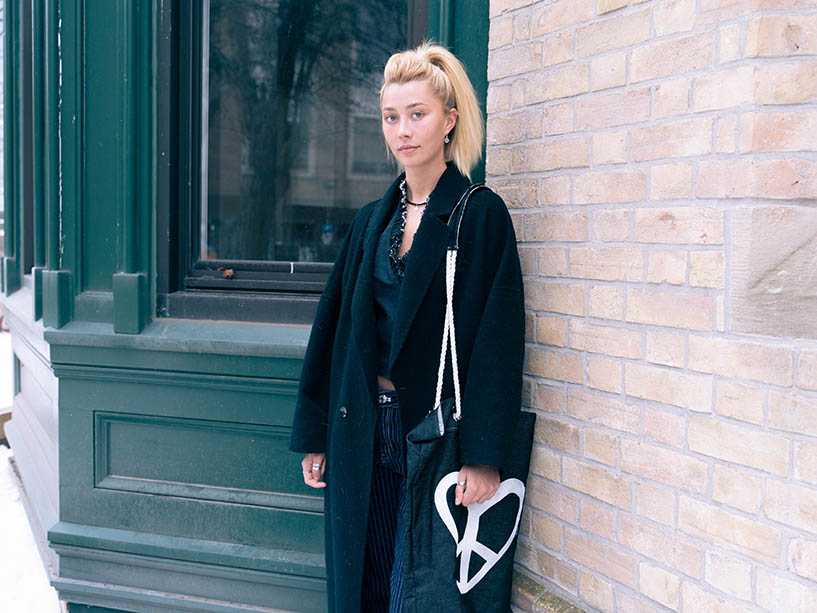
Benet Avery sells handmade clothing, jewelry and home decor out of a retrofitted 1962 camper trailer parked in the Beaches. Photo credit: Jaye Huynh.
Name: Benet Avery
Program: Fourth-year entrepreneurship student in the at the Ted Rogers School of Business Management
Company: Surf Beni (external link)
Tell me about your company and what inspired the idea?
I started my business because I struggled with a severe eating disorder when I was younger and I used to do positive affirmations as a way of healing. I started making sterling silver bracelets and necklaces with sayings on them and t-shirts with positive quotes.
In 2018, I purchased a 1962 camper trailer that my mom and I converted into a boutique store with mostly repurposed materials. I hand make all of the clothing, jewelry and home decor that we sell and each product includes positive affirmations meant to make people feel good about themselves.
How has Zone Learning helped you in your journey?
I am incubated in the Fashion Zone, which has offered me so many resources and opportunities to improve my business. Recently I learned how to make a tech pack, which is a document created by designers, technical designers and product developers.
Looking to get involved in Zone Learning? Attend the upcoming design thinking and ideation workshop aimed to help women-identifying students interested in starting their own venture, find out more on the website or talk to a Zone Navigator to get started.
Related stories: